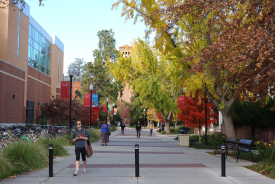An Eye Test to Diagnose Alzheimer’s? Research Says Possible
ByAn international team of researchers has moved one step further in finding a cure for Alzheimer's.
The researchers, from Georgetown University Medical Center (GUMC) and the University of Hong Kong have found out an easier and inexpensive way to detect Alzheimer's - the most common form of dementia.
By a simple eye test, physicians can speed up the diagnosis process, provide timely medications to the patients and track the progression of Alzheimer's disease. If patients are diagnosed sooner, they can change their diet or do more exercise in an attempt to keep their brain healthy for as long as possible.
Till date, there is no definitive diagnostic tests Alzheimer's. Usually, the diagnosis process for Alzheimer's includes memory tests and brain scans. However, physicians are certain only after examining the patient's brain after their death.
When the researchers examined retinas from the eyes of mice genetically engineered to develop Alzheimer's disease, they found that the inner nuclear layer had a 37 percent loss of neurons and the retinal ganglion cell layer had a 49 percent loss when compared to their healthy counterparts of the same age.
"The retina is an extension of the brain, so it makes sense to see if the same pathologic processes found in an Alzheimer's brain are also found in the eye," Researcher Scott Turner, of Georgetown University in Washington DC, said in a statement.
It is believed that when brain cells die in Alzheimer's, eye cells also die at the same time, causing thinning of the retina.
Speaking at the Society for Neuroscience's annual conference in San Diego, California, Turner said that the research is still in early stages and yet to be proven in humans. If the tests yield successful results in humans, the equipment used in the detection of other eye problems can also be used to diagnose Alzheimer's.
"Changes in the brain are found ten to 20 years before the onset of dementia. Retinal thinning may similarly predict impending Alzheimer's disease but this is speculation so far," Turner told the Daily Mail UK.
© 2025 University Herald, All rights reserved. Do not reproduce without permission.








